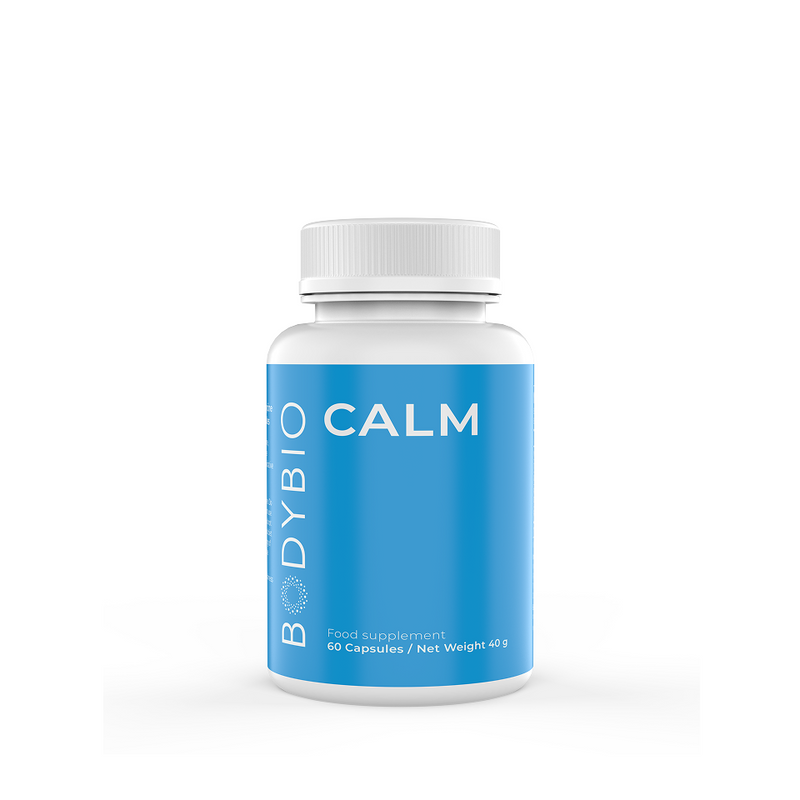How the Feedback Loop of Chronic Stress and Inflammation Is Damaging Your Cells
Key Takeaways:
Stress has become so woven into modern life that many people accept it as inevitable. Yet emerging research reveals something remarkable: the connection between chronic stress and inflammation runs deeper than most realize, operating at the very foundation of cellular health.
When stress becomes chronic, it doesn't just affect your mood or energy levels. It triggers a cascade of inflammatory responses that can compromise your immune system, disrupt cellular repair mechanisms, and accelerate aging from the inside out. Understanding this stress-inflammation connection—and more importantly, how to interrupt it—may be one of the most powerful steps you can take for long-term health.
In this blog, we’ll examine how chronic stress transforms into systemic inflammation at the cellular level, why this matters for your 40 trillion cells, and evidence-based strategies to help your body build resilience against daily stressors while supporting optimal cellular function.
Table of Contents:
-
What Is Inflammation?
-
The Hidden Stress-Inflammation Connection
-
The Real Health Cost of Stress-Driven Inflammation
-
How to Reduce Stress-Related Inflammation
-
Breaking the Stress-Inflammation Cycle
What Is Inflammation?
Inflammation is your body's natural defense mechanism. When you cut your finger or catch a cold, inflammation rushes in to clear out damaged cells and fight off invaders. In the short term, it’s actually a good thing—this acute inflammatory response keeps you alive and healthy.
But chronic inflammation works differently; instead of responding to a real threat and then settling down, the immune system gets stuck in "on" mode. Immune cells start attacking healthy tissues, repair systems can't keep up, and the body begins aging faster than it should.
Recognizing chronic inflammation can be challenging. Unlike the obvious swelling and heat of acute inflammation, this persistent type often flies under the radar for years. By the time many people recognize the symptoms, it may have already set the stage for heart disease, diabetes, autoimmune conditions, or cognitive decline.
However, if you know what to look for, you can stop and reverse chronic inflammation before it leads to these adverse downstream consequences.
The Hidden Stress-Inflammation Connection
The human body can't tell the difference between a charging lion and a demanding boss. Both flip the same ancient survival switches that jumpstart inflammation in the body.
Whether it's work deadlines, relationship drama, or financial worries, stress activates survival systems that kick into high gear. The same biological pathways that kept our ancestors alive during actual life-or-death situations now respond to modern stressors that never really go away.
This constant "go" signal creates real damage to the foundation of health, even down to the level of individual cells.
How Chronic Stress Hijacks Your Immune System
The moment the brain senses stress, it starts a complex chain reaction that was never designed to run 24/7. First, the hypothalamus releases a hormone called corticotropin-releasing factor (CRF). This tells the pituitary gland to release another hormone (ACTH), which then signals the adrenal glands to pump out stress hormones like cortisol and adrenaline. You may know this process as the “HPA axis.”
In the short term, your immune system works beautifully. It sharpens focus, boosts energy, and temporarily dials down inflammation so the body can handle whatever's coming at it.
But when stress becomes a daily reality, this perfectly designed system starts to malfunction. The immune system gets its wires crossed. Recent research published in Frontiers in Science shows that chronic stress creates "inflammatory stress" that can spread through populations and mess with our ability to think clearly.
How Cortisol Affects Cellular Health
In the right amounts, cortisol helps regulate metabolism, keeps inflammation in check, and gets you out of bed each morning. But when ongoing stress keeps cortisol levels sky-high for weeks, months, or years, it starts damaging cells at the most basic level.
Here's what too much cortisol does to cell-level health:
-
Damages protective membranes: The phospholipid layers around each of your 40 trillion cells get worn down when constantly exposed to stress hormones
-
Sabotages energy production: Cellular power plants (mitochondria) produce less energy while cranking out more cell-damaging free radicals
-
Speeds up aging: Chronic cortisol exposure actually shortens telomeres, those protective caps on chromosomes that determine how fast you age
-
Confuses immune responses: This is why persistent stress makes you more likely to get sick AND more prone to autoimmune issues
A 2019 study found that chronic stress creates persistent low-grade inflammation that affects multiple body systems. Even after the initial stress ends, this inflammation can stick around for months, creating a cycle where the inflammation itself becomes a source of stress.
Cell membranes take a major hit. Membranes are made mostly of phospholipids, with phosphatidylcholine (PC) being the star player. When ongoing stress damages these membrane fats, cells can't properly transport nutrients in or waste out, compromising health at the most fundamental level.
Gut Health and the Stress-Inflammation Cycle
Your gut health might be the most underrated player in the stress-inflammation game. Scientists call it your "second brain" because of all the nerve cells packed in there, but it's also where stress often transforms into body-wide inflammation.
Persistent stress triggers several damaging processes in the digestive system:
1. The gut barrier breaks down, potentially causing “leaky gut,” or intestinal permeability. The tight connections between intestinal cells normally act like club bouncers, deciding what gets into the bloodstream. Under stress, these connections loosen up, allowing food particles, toxins, and bacteria to slip through and trigger immune reactions throughout the body.
Researchers at the University of Pennsylvania recently figured out exactly how ongoing stress talks to gut inflammation. They found that support cells (glial cells) relay stress signals from the brain to the gut's nervous system, directly triggering inflammatory responses in the intestines.
2. Gut bacteria shift toward troublemakers. Ongoing stress changes the mix of bacteria in the gut, reducing the helpful species while allowing inflammatory bacteria to take over. These shifts don’t just affect digestion; they can also show up in other areas of health, including the skin.
Studies show that stress-altered gut bacteria actually send signals back to the brain that fuel anxiety and depression, creating a nasty feedback loop.
3. Gut neurochemical production gets disrupted. The intestinal tract makes many of the same brain chemicals as the actual brain, including serotonin, GABA, and dopamine. When stress messes with gut bacteria, production of these mood-regulating chemicals goes haywire.
The stress-gut-inflammation cycle also hits butyrate production, a critical short-chain fatty acid that helps keep the intestinal barrier intact and reduces inflammation throughout the body. When stress kills off the good bacteria, butyrate levels drop, making gut problems even worse.
The Real Health Cost of Stress-Driven Inflammation
At the cell level, ongoing stress creates something scientists call "inflammaging." This is where cells stay constantly inflamed and age way faster than they should.
Mitochondrial function declines rapidly. These cellular powerhouses are incredibly sensitive to stress hormones. When cortisol levels stay high, these energy-producing engines produce less fuel while churning out more cell-damaging free radicals. The specialized fats in mitochondrial membranes (like cardiolipin) get damaged and can't do their jobs properly.
Autophagy systems become overwhelmed. Cells have effective systems for clearing out damaged proteins and worn-out parts through a process called autophagy. Persistent inflammation overwhelms these cleanup systems, allowing cellular junk to pile up—a hallmark of faster aging.
Cell membrane composition changes. The phospholipids that make up cell membranes control membrane flexibility, nutrient transport, and how cells talk to each other. Ongoing stress and inflammation mess with membrane composition, reducing the essential fats that keep membranes working properly.
Cellular repair mechanisms slow down. Cells are constantly fixing minor DNA damage that happens naturally. Studies show that chronic stress hormones interfere with these repair systems, potentially raising cancer risk and speeding up aging.
Heat shock proteins begin malfunctioning. These molecular helpers normally keep other proteins folded correctly during stressful times. But when stress becomes chronic, these protective proteins can get released outside cells, where they actually trigger more inflammation and create cycles of cellular damage.
Why Autoimmune Conditions Are Skyrocketing
Autoimmune diseases have been rising by 3-12% every year for decades now, and stress-induced inflammation appears to be a major reason why.
When the immune system stays constantly activated by stress hormones and inflammatory signals, it starts losing its ability to tell the difference between foreign invaders and healthy tissues. This happens through a process called molecular mimicry. Stress-generated inflammatory proteins look similar enough to cellular proteins that the immune system attacks both.
A 2023 study in Immunity found that cellular stress in the gut lining directly promotes production of specific immune cells that strongly correlate with autoimmune conditions like rheumatoid arthritis, multiple sclerosis, and inflammatory bowel disease.
When gut cells experience a particular type of stress, they start producing molecules that basically train immune cells to be more inflammatory and reactive. These overactive immune cells then travel throughout the body, potentially attacking healthy tissues in joints, organs, and other systems.
Your Heart and Metabolism Under Attack
Heart disease remains the leading cause of death worldwide, and persistent inflammation plays a starring role. Beyond cholesterol issues, stress-induced inflammation directly damages blood vessels and throws metabolism off track.
Inflammation damages artery walls. When inflammatory chemicals circulate through the bloodstream, they make the cells lining arteries sticky and dysfunctional. This attracts immune cells, which burrow into artery walls and create unstable plaques that can rupture and cause heart attacks.
Recent studies show that people with ongoing stress and high inflammatory markers have a 40-60% higher risk of heart problems, even when accounting for traditional risk factors like cholesterol and blood pressure.
Persistent cortisol makes cells resistant to insulin, causing your metabolism to go haywire, which can potentially set your body up for type 2 diabetes. Stress hormones also tell the liver to make more glucose, promote belly fat storage, and mess with the hormones that control hunger and fullness.
The inflammatory chemicals released during ongoing stress directly interfere with how insulin works, making it harder for cells to absorb glucose from the bloodstream. This creates a cycle: high blood sugar, insulin resistance, and persistent inflammation, all reinforcing each other.
When Stress Rewires Your Brain
Perhaps the most concerning effect of ongoing stress-induced inflammation is what it does to the brain. The brain should be protected by the blood-brain barrier, which carefully controls what gets into brain tissue. But persistent inflammation can breach this protective wall.
Inflammatory chemicals interfere with the production and function of serotonin, dopamine, and other neurotransmitters that regulate mood, motivation, and thinking. This explains why chronic stress and inflammation are so tightly linked to depression and anxiety.
Persistent cortisol exposure can actually shrink the hippocampus and impair the ability to form new memories. The hippocampus (the brain's main memory center) is especially vulnerable to stress hormones. Meanwhile, inflammation disrupts the creation of neural connections essential for learning and adapting to change.
Brain tissue is packed with phospholipids, especially PC and PE (phosphatidylethanolamine), which are essential for making brain chemicals and helping neurons communicate. Ongoing stress depletes these critical membrane fats, hurting brain function at the most basic level.
Chronic stress can also encourage your brain to age faster. Brain inflammation contributes to neurodegenerative diseases like Alzheimer's and Parkinson's. Studies suggest that persistent stress-induced inflammation may speed up the buildup of harmful proteins in the brain while impairing the systems that clear cellular waste, potentially raising dementia risk.
How to Reduce Stress-Related Inflammation
Unlike many health threats, stress is something you have real power to influence. While you might not be able to eliminate every stressor from life, you can absolutely change how the body responds to them.
Reducing stress-induced inflammation takes a multi-angle approach that supports the foundation of health at the cell level. The goal is to tackle inflammation head-on, support the body's natural stress-management systems, and strengthen the processes that ongoing stress has been undermining.
Foods That Help Your Body Fight Stress
Your diet is one of the strongest weapons against inflammation. The key is strategically choosing foods that help build stress resilience while actively cooling down inflammatory processes at the cell level.
Omega-3 and omega-6 fatty acids are the building blocks for specialized molecules called resolvins and protectins, which actively help the body resolve inflammation and get back to a healthy baseline. People with higher essential fatty acid levels consistently show lower inflammatory markers and better stress resilience.
The ratio between these fats matters a lot. A 4:1 omega-6 to omega-3 ratio can positively impact brain function, digestive health, immune support, liver function, and heart health. This specific balance affects membrane properties like flexibility and permeability, crucial factors for stress resilience at the cell level.*
Focus on fatty fish like salmon, sardines, and mackerel, or high-quality fish oil supplements. These essential fats work best when they're properly incorporated into cell membranes, which requires adequate phospholipids for transport and integration.*
Colorful plants offer natural anti-inflammatory compounds. The polyphenols in berries, leafy greens, and herbs do more than just act as antioxidants; they actually modulate your immune system's inflammatory responses at the cell level.
-
Turmeric curcumin can block NF-κB, a protein complex that acts like a master switch for inflammatory gene expression.
-
Anthocyanins in berries help stabilize the blood-brain barrier, protecting the brain from inflammation.
-
Quercetin in onions and apples helps control mast cell reactions, reducing histamine-driven inflammation.
Remember that gut-brain connection? Fiber feeds anti-inflammatory bacteria. The beneficial bacteria in the gut make short-chain fatty acids like butyrate when they break down a certain type of fiber from food. Butyrate is one of the body's most powerful anti-inflammatory molecules, directly helping heal the gut lining and reducing inflammation throughout the body.*
Focus on diverse, fiber-rich foods: vegetables, legumes, and whole grains provide the variety of fibers that different beneficial bacteria species need to thrive.
While food is important, meal timing is equally important because the time between meals helps support your body’s natural rhythms. Eating within consistent time windows helps regulate circadian rhythms, which optimizes cortisol patterns and reduces inflammatory stress. Consider giving the digestive system a 12-hour overnight break; this supports the body's natural cleanup processes at the cell level.
Lifestyle Strategies That Actually Work
The most effective approaches to lower your cortisol and build "stress resilience," the ability to maintain stable inflammatory responses even when facing challenges, help rewire the stress response system over time.
4 simple, effective lifestyle tips you can incorporate into your daily routine:
-
Breathwork helps reset the nervous system. Breathing gives you direct access to the autonomic nervous system. Slow, deep breathing (especially extending the exhale) activates the parasympathetic nervous system and signals the body to shift out of stress mode.
Try the 4-7-8 technique: breathe in for 4 counts, hold for 7, breathe out for 8. This pattern stimulates the vagus nerve, which helps regulate inflammatory responses and improves gut-brain communication. -
Movement is medicine. Exercise creates an interesting paradox: it's acute stress that actually makes you more resilient to ongoing stress. Regular physical activity lowers baseline inflammatory chemical levels, improves the body's ability to clear cortisol, and promotes the production of anti-inflammatory molecules.
Consistency beats intensity. A daily 20-30 minute walk can be better for stress-induced inflammation than sporadic high-intensity workouts that might add more stress to an already overwhelmed system. -
Sleep quality is non-negotiable. Poor sleep is both a result of ongoing stress and a major driver of inflammation. During deep sleep, the brain activates its waste removal system (the glymphatic system) that clears inflammatory proteins and cellular debris.
Focus on sleep basics: consistent bedtime, cool dark room, and no screens an hour before bed. If stress keeps the mind spinning, try a "brain dump,” write down worries and tomorrow's tasks before sleep to signal the brain it can stop processing them. -
Cold exposure provides beneficial stress. Controlled cold exposure creates what's called hormetic stress: brief, beneficial stress that actually strengthens the stress-response system. Regular cold exposure can help regulate cortisol patterns, reduce inflammatory markers, and improve stress resilience. (Note: research about cold exposure is ongoing, and we are still learning about the different effects of cold exposure for women vs men. Don’t force yourself to do cold exposure if you feel it’s not right for you.)
Start small: 30 seconds of cold water at the end of a shower, building up gradually over time.
Strategic Supplement Support
While lifestyle changes form the foundation of stress and inflammation management, certain supplements can provide targeted support for the specific pathways that ongoing stress disrupts, particularly at the membrane level.
Adaptogens like ashwagandha, rhodiola, and holy basil work by fine-tuning the HPA axis, can help regulate your body’s cortisol response by normalizing cortisol patterns, and reducing stress-induced inflammation.
Amino acids support brain chemical balance. Persistent stress depletes key amino acids the brain needs to make calming neurotransmitters. L-theanine (found in green tea) promotes relaxation without drowsiness by boosting GABA activity. Taurine helps regulate stress responses and supports energy production at the cell level by stabilizing membranes.
Phospholipids are the most fundamental level of support. Ongoing stress damages membranes and disrupts communication throughout the body. Phospholipids like PC and PS (phosphatidylserine) provide the raw materials cells need to repair and maintain healthy membranes, improving everything from energy production to neurotransmitter function.*
These nutrients are especially important for brain health, since neurons depend on healthy membrane function for proper signaling and communication. PC makes up the majority of membrane building blocks, helping nutrients get into cells while escorting waste and debris out, directly supporting better metabolism and overall health at the cell level.*
Essential fatty acid balance supports membrane health. Beyond individual phospholipids, maintaining proper essential fatty acid ratios helps ensure optimal membrane function. This foundation supports the ability to resist stress-induced damage and maintain appropriate inflammatory responses.*
We include key phospholipids, amino acids, minerals and adaptogens in BodyBio Calm that support a balanced stress response—helping you blunt the chronic stress cycle that comes with raising kids, work deadlines, and the chaos of modern life.*
Breaking the Stress-Inflammation Cycle
The science is crystal clear: stress isn't just an unavoidable part of modern life. It's a serious health threat, but one that you have real power to address at the cell level. Unlike genetic factors or environmental toxins you can't always control, stress response is something you can actively reshape by supporting the foundation of health—your cells.
The human body has a remarkable healing capacity. The same systems that ongoing stress can damage also have incredible potential for repair and regeneration when given the right support. Every anti-inflammatory meal you eat, every deep breath you take, every quality night of sleep you get sends powerful signals to your 40 trillion cells that it's safe to heal and thrive.
When you optimize health at the cellular level, you're setting yourself up for longevity and healthy aging. The stress-inflammation cycle doesn't have to derail your health and wellness.
To support your body's natural stress response, BodyBio Calm provides adaptogenic herbs, calming amino acids, and phospholipids that support balance at the cellular level.*








